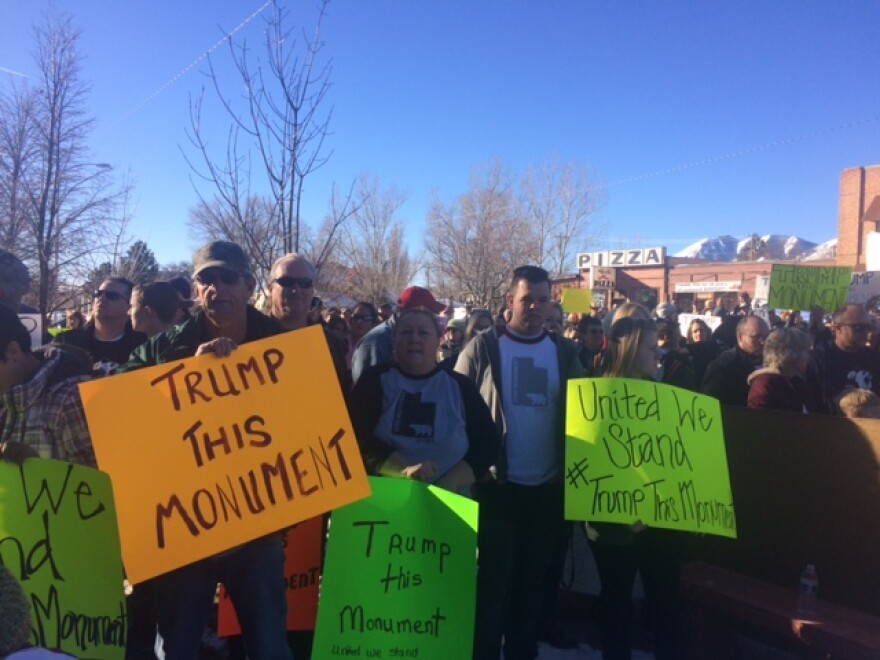One of the biggest trade shows in the outdoor industry is still looking for a new home after the Outdoor Industry Association decided to leave Utah after two decades. Colorado has thrown its hat in the ring as a new potential site for the event, which brings together many of the world’s largest outdoor companies.
“One of the things we’re going to have to focus on is how a blended economy really works,” said Luis Benitez, head of Colorado’s Office of Outdoor Recreation Industry.
But the fight over location is over more than money, jobs and bragging rights – it’s also a proxy battle over federal land ownership in the west and the outdoor industry’s growing political clout.
The fight began in the final days of the Obama Administration and the decision to designate more than 1 million acres of land in southeastern Utah as a national monument. The move angered many Utah leaders.
“I call on president Trump to reverse midnight Maui executive order,” said San Juan County Commissioner Phil Lyman at a protest in Monticello, Utah, near the Bears Ears National Monument. “This is not the founders’ design. President Trump, trump this monument.”

Utah state lawmakers, members of Congress and the governor, have said the monument was an example of federal overreach and a travesty of justice.
But many in the outdoor industry saw it as a great boon for America.
“This is a really important moment for public lands in our country,” said Hans Cole, the director of environmental campaigns and advocacy for Patagonia.
The clothing and outdoor gear company backed the Obama decision and has continued to show its support through TV ads in their “This is Bears Ears” campaign.
Patagonia was also the first company to boycott the annual Outdoor Industry Association trade show in Utah. Cole said the company couldn’t in good conscience attend the conference there.
“When you arrive in the airport there in Salt Lake City there’s these amazing pictures of all these amazing protected public lands on the walls,” he said. “There’s a real pride throughout the state of Utah in public lands. This isn’t O.K, that politicians are taking a stance and asking the new President Trump to rescind the monument.”
While many companies have cared about the public lands issue, the tenor and urgency has changed in recent months.

“I think it was initially surprising the strength that members felt,” said Amy Roberts, executive director of the Outdoor Industry Association.
“I think the fact that we started to see momentum around transferring federal public lands to the states -- where they would possibly be sold off and not accessible to Americans any more. People really felt like this was an affront to what America feels about our public lands,” said Roberts.
Most of the companies involved in the trade show quickly coalesced around leaving and states like Colorado were more than happy to compete for the $45 million bid. Democratic Sen. Kerry Donovan of Vail even touted a bill she had sponsored to create a first-of-its-kind public lands day in May.
“Very prominent and big political action is happening in western states where the public lands are our backyards and I think that’s very exciting to watch because it seems like the public lands voice is getting stronger and stronger,” said Donovan.
Congress passed a law requiring the federal government to tally the industry’s economic impact. Outdoor industry representatives hope that will elevate their clout and move them more on par with other industries like mining, timber and agriculture.
“It’s not just about outdoor and snow sports industry any more,” said Kim Miller, the North American CEO of Scarpa, which makes boots for rock climbing and backcountry skiing. “The outdoor recreation industry is now recognized as an official contributor to GDP. It’s a big number. When you start talking about $640 - $650 billion and that’s only going to grow. So we have to figure out who we are politically.”
Miller said the outdoor conference is one way to do that. He feels it’s about much more than retailers featuring the latest gear; it’s also where high-level policy discussions take place. But the industry is not monolithic. There was disagreement over pulling the conference out of Utah.
“What started as a ground swell is a movement,” said Miller. “So when you talk about activism, there are people that won’t like that decision, maybe it’s because it’s financially not as good for them, or maybe they don’t believe those are the kind of issues that a trade show should pick its location based on.”
For Colorado, Luis Benitez continues to put the bid together with a focus on how to make Colorado stand out from other bidders.
“If the outdoor industry is becoming a little bit more politically active and a little bit more politically vocal,” Benitez said, “I think it’s our responsibility to show up in a partnering kind of way, and not in an exclusive, our way or the highway kind of way, because I think that’s a losing proposition for anybody involved.
Capitol Coverage is a collaborative public policy reporting project, providing news and analysis to communities across Colorado for more than a decade. Fifteen public radio stations participate in Capitol Coverage from throughout Colorado.






